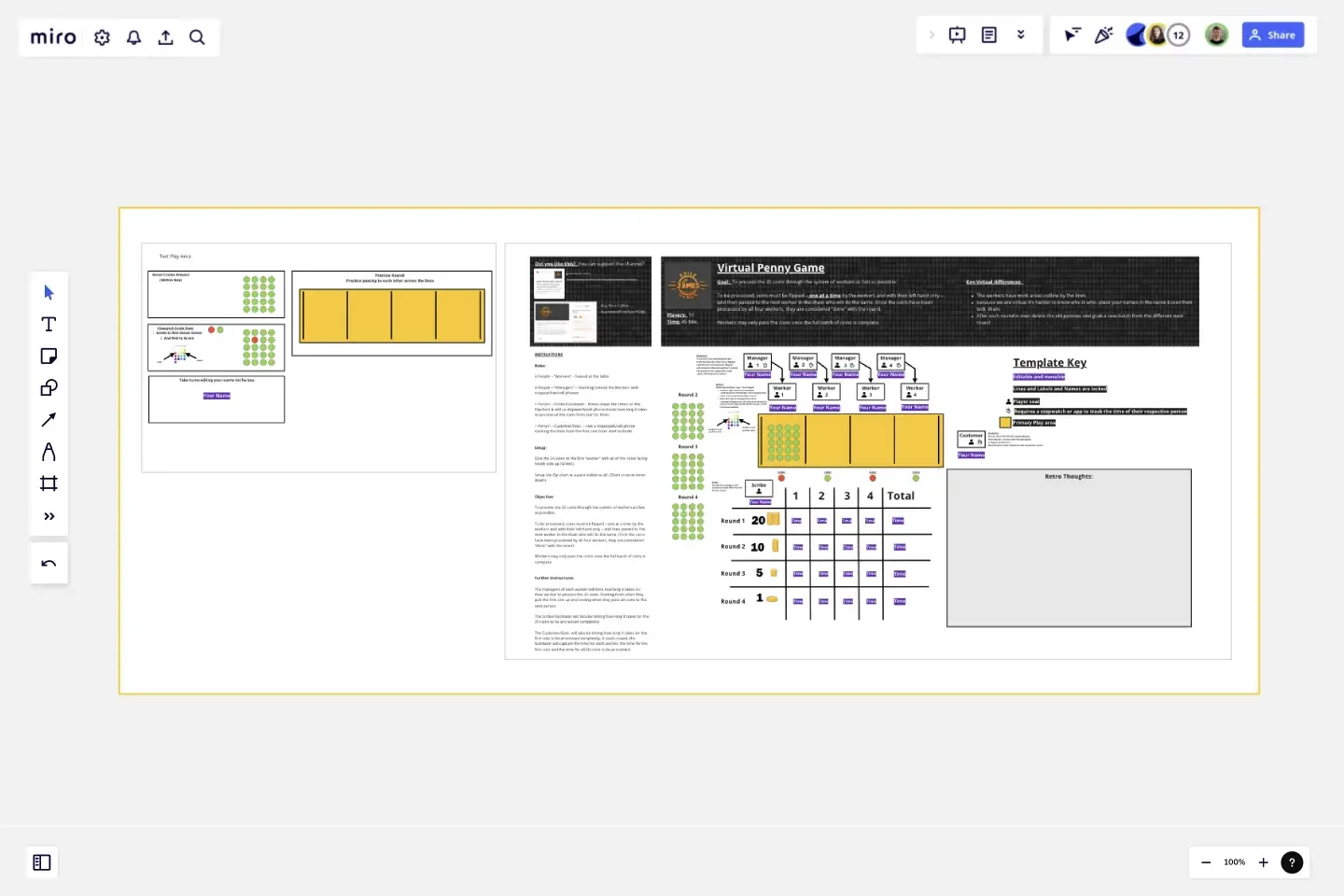Penny Game
The Penny Game is a popular agile game to teach the importance of reducing batch sizing and the evils of large workloads.
About the template
The Penny Game is a popular agile game to teach the importance of reducing batch sizing and the evils of large workloads. It helps people understand the time it takes to deliver value to a customer.
How to use this template
This game is ideally for 10 people plus the facilitator but can be scaled back to 4 people with the facilitator taking over the roles of the customer and the scribe. Each worker would then use their cell phone to start timing the start/stop time of themselves, while the facilitator tracks time from the first coin flipped/changed colour by the first worker... to the last penny flipped by the last worker.
This template was created by Agile Games With James.
Get started with this template right now.
Retrospective - Summer
Works best for:
Retrospectives, Agile Methodology, Meetings
The Retrospective - Summer template offers a seasonal and themed approach to retrospectives, perfect for capturing the spirit of summer. It provides elements for reflecting on achievements, experiences, and goals amidst the summer backdrop. This template enables teams to relax, recharge, and recalibrate their efforts for the upcoming season. By promoting reflection and rejuvenation, the Retrospective - Summer empowers teams to celebrate successes, learn from setbacks, and embark on new adventures with renewed energy and enthusiasm effectively.
Blameless postmortem canvas
Works best for:
Agile
The Blameless Postmortem Canvas is a structured framework for conducting blameless postmortems following incidents or failures. It provides sections for documenting the timeline, impact, root causes, and actionable insights. This template promotes a blame-free culture of learning and improvement, enabling teams to analyze incidents objectively, identify systemic issues, and implement preventive measures. By fostering transparency and accountability, the Blameless Postmortem Canvas empowers organizations to learn from failures and enhance resilience, driving continuous improvement and reliability.
Features Prioritization Tool
Works best for:
Agile
The Features Prioritization Tool offers a systematic approach to prioritizing product features based on criteria such as value, effort, and strategic alignment. It provides a structured framework for capturing, evaluating, and ranking feature ideas, enabling teams to make informed decisions about what to build next. With customizable scoring mechanisms and visual dashboards, this template empowers product teams to optimize their product roadmap and deliver maximum value to customers, driving competitiveness and market success.
Lean Coffee: Meetings without Agendas
Works best for:
Agile
Lean Coffee: Meetings without Agendas is a collaborative meeting format that fosters open dialogue and emergent topics. Participants suggest discussion topics, vote on them, and engage in time-boxed conversations. This template provides a structured framework for facilitating Lean Coffee sessions, enabling teams to prioritize topics, share insights, and make decisions collectively. By promoting inclusivity and adaptability, Lean Coffee empowers teams to address issues efficiently and drive continuous improvement.
DMAIC Analysis Template
Works best for:
Agile Methodology, Design Thinking, Operations
Processes might not seem like the funnest thing to dive into and examine, but wow can it pay off—a more efficient process can lead to serious cost savings and a better product. That’s what DMAIC analysis does. Developed as part of the Six Sigma initiative, DMAIC is a data-driven quality strategy for streamlining processes and resolving issues. The technique is broken into five fundamental steps that are followed in order: Define, Measure, Analyze, Improve, and Control.
Lean Change Self-Starter Kit
Works best for:
Agile
The Lean Change Self-Starter Kit is a comprehensive resource for initiating organizational change using Lean principles. It provides tools and templates for assessing readiness, defining change objectives, and planning interventions. This template empowers change agents to navigate complexity, engage stakeholders, and drive meaningful transformation. By promoting adaptability and experimentation, the Lean Change Self-Starter Kit enables organizations to embrace change as a competitive advantage and achieve sustainable growth.
